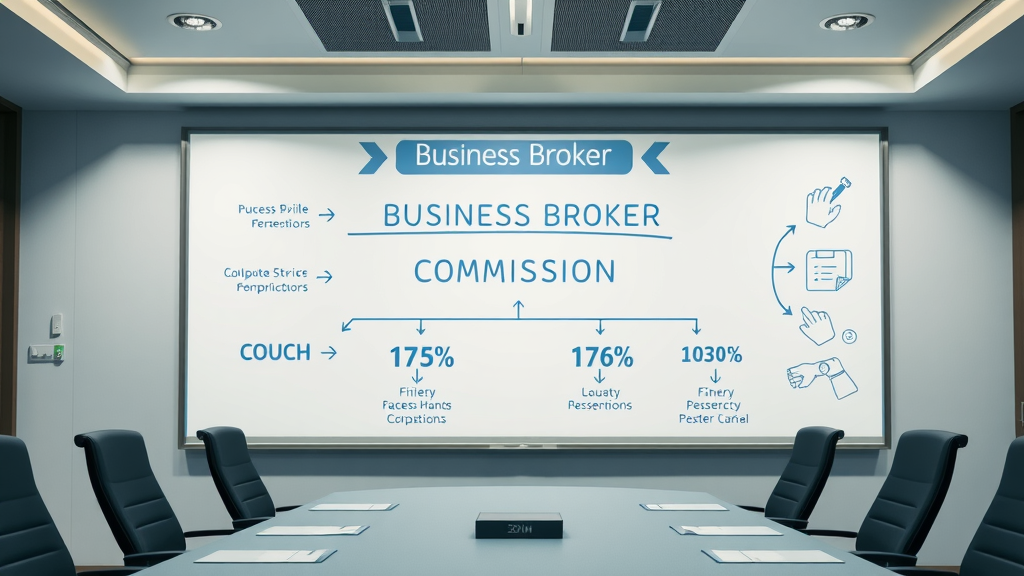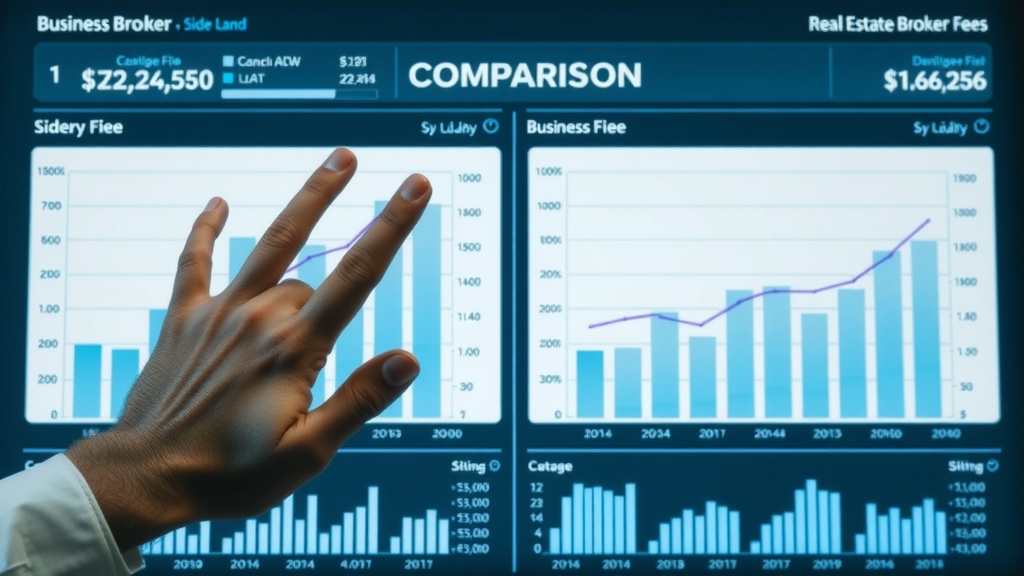Are you confident you’re not leaving thousands on the table in broker fees when selling your business? Navigating the world of business broker commission can feel overwhelming, with hidden fees and confusing terms clouding your profit. Whether you’re a business owner selling your first venture or considering listing a company for sale, understanding how brokers charge—and what’s fair—could mean the difference between a lucrative deal and losing money unnecessarily. This guide cuts through the jargon, lays out industry standards, and arms you with proven tactics so you never overpay a business broker fee again.

Are You Paying Too Much in Business Broker Commission?
Many business owners grapple with the uncertainty of whether their business broker commission is justified or simply too high. With rates varying widely by region, broker reputation, and transaction complexity, it’s no surprise that sellers often worry about overpaying. The decision to sell your business involves not just finding the right buyer, but also ensuring that your broker fees don’t erode your final profit. For this reason, researching how business brokers charge , what the typical fees are, and how to negotiate better terms is essential for protecting your interests and maximizing the value you receive from selling your business.
It’s critical to assess your broker’s proposed fee structure well before signing on the dotted line. Transparent brokers will outline charges clearly, while those focused on maximizing personal gain might sneak in additional or undisclosed fees. The impact can be especially significant on small businesses, where a single percentage point in broker commission or a hefty upfront fee represents a substantial chunk of your hard-earned proceeds. Understanding the intricacies of business broker fees ensures you stay in control and empowers you during negotiations.
Why Understanding Business Broker Commission Matters
- Maximize profits: Informed sellers retain more of their sale price by scrutinizing commission structures.
- Transparency: Clear knowledge of typical broker fees helps build trust and prevents surprises at closing.
- Avoid hidden broker fees: Vigilant research exposes excessive or unnecessary charges before they erode your returns.
Definition and Structure of Business Broker Commission

What Is a Business Broker and How Do They Charge?
Business brokers are intermediaries who facilitate the sale of businesses by connecting sellers with potential buyers, managing negotiations, and streamlining the transaction process. Their compensation typically comes in the form of a business broker commission , which is a fee based on a percentage of the final sale price. In most cases, business brokers charge this fee only when a successful sale is completed—a structure known as a success fee . However, some arrangements require upfront fees or retainers, especially for larger or more complex transactions where significant pre-sale work is involved.
The overall fee structure can include minimum commissions (to ensure brokers are compensated for smaller deals), marketing costs, and additional charges if special expertise (like business valuation or targeted buyer searches) is required. As every business sale is unique, you should ask for a line-by-line breakdown so you fully understand how your broker will be paid and for what services.
The Difference Between Broker Fees and Success Fees
Broker fees generally refer to all fees paid to a broker, but within this, there are crucial distinctions. The success fee is the percentage charged upon the successful closing of a business sale , usually the largest single component of a business broker fee . In contrast, some brokers also request an upfront payment—an upfront fee —to cover initial marketing efforts, business valuation, or administrative setup.
Understanding these differences is essential because success-based compensation aligns the broker’s interests directly with yours: if they don’t close the sale, they don’t get paid. Conversely, upfront fees pose a risk if the broker performs poorly or the sale doesn’t happen—making transparency and accountability in your agreement critical.
| Fee Structure | Description | Typical Range | Applicability |
|---|---|---|---|
| Success Fee | Percentage of final sale price, paid at closing | 5%–12% | All business types; industry standard |
| Upfront Fee | Flat fee paid before marketing or listing begins | $2,500–$20,000+ | Complex, high-value, or hard-to-sell businesses |
| Minimum Commission | Base fee regardless of sale price | $10,000–$25,000 | Low-value business sales |
| Marketing Fee | Separate charge for advertising, listing, and materials | $500–$5,000 | Optional or as-needed |
Typical Business Broker Fees: What to Expect When Selling a Business
How Business Brokers Typically Charge for Their Services
When working with business brokers to sell your business , understanding their typical charges is crucial for budgeting and comparing offers. Most business broker fees are assessed as a percentage of the deal’s final sale price—commonly between 8% and 12% for small to mid-sized deals. Some brokers implement a minimum commission to guarantee their compensation if the business sells for less than anticipated, while others apply a hybrid structure involving a combination of success fees and upfront retainers.
Additional charges aren't uncommon. These can include marketing fees for listing your company on online marketplaces or preparing professional materials, and sometimes administrative costs—each of which can add up if not clarified from the start. Always request a detailed, itemized breakdown from your broker, and clarify if fees are refundable should your business not sell during the listing term. This diligence helps prevent misunderstandings and highlights brokers committed to transparency.
- Percentage of sale: Standard commission, usually ranges from 8%–12%.
- Upfront fee: Retainer paid prior to listing, often to cover valuation and marketing expenses.
- Minimum commission: A base fee to ensure broker compensation on lower-value deals.
- Additional fees: Marketing, legal, or administrative charges which may apply independently of the final sale outcome.

Business Broker Fees vs. Real Estate Broker Fees
Though both business brokers and real estate brokers charge commissions, business broker commission rates are typically higher. This is due to the complexities of selling a business compared to selling property alone. While real estate brokers may charge 5–6% commission, business brokers usually charge more—reflecting the additional services such as business valuation, buyer qualification, and negotiating complex deal terms. When evaluating your broker’s proposal, be aware of these differences and ensure you’re not being quoted exceptionally high rates under the guise of real estate norms.
The justification for higher business broker fees often lies in the skills required—understanding financial statements, navigating legal intricacies of business sales , identifying synergies between the buyer and the business, and even assisting with due diligence or transition planning. This expertise can command a premium, but it's essential that the fee aligns with the value delivered and industry benchmarks for similar transactions.
Current Industry Standards: Average Business Broker Commission Rates

Average Broker Fee Percentages for Small Businesses vs. Larger Business Sales
Small business sales typically see higher percentage commissions, often ranging from 10% to 12%, reflecting the greater effort brokers expend relative to the deal size. In contrast, larger business transactions, especially those exceeding $1 million in value, frequently command commissions in the 5%–8% range—or follow scaled structures such as the Double Lehman or Lehman Formula. This tiered approach recognizes that while larger deals require more expertise, the absolute dollar amount is significant, justifying smaller percentage rates.
Keep in mind that business owner s with small- to mid-sized businesses are more likely to encounter “minimum commission” clauses and higher upfront fees due to perceived risks. Review any commission agreements for these thresholds when negotiating your deal.
What Percentage Do Business Brokers Typically Charge?
The standard business broker commission falls between 8% and 12% for companies valued under $2 million. As transactions grow larger, competitive pressure and economies of scale drive the percentage down—sometimes approaching 5% for multi-million dollar deals. Unusually low or high rates can signal either a lack of service (cut-rate providers) or potentially excessive charges (overly aggressive brokers), so always benchmark your offer against industry averages specific to your business’s value and sector.
| Deal Size | Commission Percentage | Notes |
|---|---|---|
| Under $500,000 | 10%–12% | Includes minimum commissions, common for small businesses |
| $500,000 – $2 million | 8%–10% | Tapered rates, more negotiation possible |
| $2 million – $5 million | 6%–8% | Tiering and Double Lehman formula may apply |
| Over $5 million | 4%–6% | Lehman formula, negotiated rates, or retainer-based |
Factors That Influence Business Broker Commission Rates
Business Value, Industry, and Market Impact on Broker Fees
Sophisticated business brokers tailor their business broker commission based on several factors: the estimated value or asking price of your business, industry sector, and current market dynamics. Highly sought-after industries with many active buyers, such as technology or healthcare, may command lower commission rates due to competition among brokers. Conversely, businesses in niche or distressed industries may face higher commission percentages or upfront fees reflecting brokers’ greater need for specialized marketing and effort.
Recent market trends, economic cycles, and fluctuations in buyer activity also influence what business brokers charge . For example, in hot seller’s markets with many buyers, brokers might lower their rates to stay competitive, while more challenging environments may prompt a hike in fees to compensate for increased marketing and outreach.

Complexity, Location, and Deal Structure in Business Broker Charges
Complex transactions—those with multiple locations, involved legal structures, or requiring special licensing—increase the time commitment and expertise needed, which brokers often offset by charging higher commissions or additional success fees. If your business sale involves cross-border elements or deals with unique intellectual property, expect this complexity to be reflected in your broker fee .
The geographic location of your business also matters. Urban or high-demand markets might feature marginally lower commission percentages compared to rural or specialized regions, where finding qualified buyers can be more arduous. Lastly, deal structure—whether buyers are paying cash, using seller financing, or involving equity rollovers—can affect both when and how much business brokers get paid, so ensure these terms are spelled out in your agreement.
How Specialization (e.g., Investment Bank, Business Loan Broker) Affects Fee Structure
Investment banks and firms specializing in specific transaction types may deploy unique fee structures . For example, investment banks involved in large-scale mergers and acquisitions often charge lower percentage commissions but higher flat retainers or monthly fees, reflecting their role in high-value, complex deals. Business loan brokers , meanwhile, might bill a much smaller percentage—typically 1% to 3% of the financed amount—with or without a minimum commission or success fee component.
Specialized brokers may also charge premium rates for expertise in regulated sectors (pharmacy, education, finance) or when orchestrating international transactions. Always verify the proposed commission model with others in your industry before committing, and ask for relevant case studies or references demonstrating value delivered for similar deals.
Understanding Upfront Fees and Success Fees: What Sellers Need to Know
Are Upfront Fees Justified When Selling a Business?
While legitimate in certain circumstances, upfront fees should be carefully justified and clearly outlined. Sellers should review what specific services—such as in-depth business valuation, branded marketing campaigns, or confidential buyer searches—these initial fees support. If an upfront fee is simply added on top of an already substantial success fee , this may indicate an overpriced or less-than-transparent broker arrangement.
It’s reasonable to pay a modest upfront fee if complex groundwork is essential to selling your business, but these costs must correlate with deliverables, and terms for refunds or application towards later commissions should be stated in writing. If a broker can’t demonstrate how their upfront fee supports your business sale’s success, it’s best to keep searching.
Common Success Fee Scenarios and Triggers in Business Sale Agreements
Success fees —the cornerstone of most business broker fee agreements—are typically triggered only when your business actually changes hands and funds are transferred. However, smart sellers should clearly define all “success” scenarios in their agreements: What if the deal falls through at the last moment, or is structured as a partial sale? What if a buyer approaches post-listing, having seen your broker’s earlier marketing?
Ensuring clarity on all possible deal outcomes—especially with respect to “qualified buyers” or “financing contingencies” in your contract—prevents later disputes and guarantees everyone’s interests are aligned throughout the process.
Expert insight: "A transparent commission structure shows a business broker’s integrity and commitment to your success."
Avoiding Excessive Business Broker Fees: Pro Tips and Negotiation Tactics

How to Negotiate Business Broker Commission and Reduce Your Fees
Effective negotiation can shave thousands—sometimes tens of thousands—off your total broker fees. Treat broker commission proposals as starting points, not ultimatums. Solicit quotes from multiple business brokers to create competitive tension and request sliding scale commissions, which decrease as your sale price increases. Clarify which services are included with the commission and which incur additional charges.
- Shop around competitively: Compare 2–4 broker fee structures before choosing.
- Request sliding scale arrangements: Push for lower percentages on higher-value sales.
- Clarify all services: Insist on a detailed contract outlining what’s included in your fee.
- Examine the fine print: Watch for vague minimums, cancellation penalties, or non-refundable upfront fees.
- Consider alternative models: Success-only fees, flat commissions, or capped rates may suit your needs best.
Red Flags Indicating Overpriced Broker Fees
Stay vigilant—excessive or misleading charges can erode your hard-won profits. Red flags include demand for large, non-refundable upfront payments with minimal explanation, commission rates above industry norms (especially those exceeding 12% for non-niche deals), vague contract language, and brokers unwilling to clearly detail their services or provide comparable references. If you notice these warning signs, continue your due diligence until you find a broker who values transparency and your business’s success.
Furthermore, pressure sales tactics, a lack of written agreements, or refusal to provide itemized billing may indicate an unscrupulous or inexperienced operator. Work only with professionals who communicate openly and are eager to negotiate on structure and price.
How to Calculate the True Business Broker Commission You’ll Pay

Sample Calculation for Business Sale Commission
Imagine selling your business for a final sale price of $1 million. With a broker commission of 10%, your base success fee would be $100,000. If your broker charges a minimum commission of $25,000, this would only apply if your business sells for less. Additional charges—say, a $3,000 marketing fee and a $5,000 upfront retainer—would add directly to your out-of-pocket costs, making your total broker cost $108,000. Understanding this process helps you weigh potential savings at each step of negotiation.
Always ask brokers for sample calculations across multiple price points or deal scenarios, especially if minimum commissions or tiered rates apply, so there are no financial surprises at closing.
Using Online Business Broker Commission Calculators
Many business owners rely on online commission calculators to estimate their broker fees in advance. These tools simplify inputs—just enter your projected sale price , anticipated commission percentage, and any known upfront fees or marketing costs. Calculators provide you with a quick total, but remember to factor in the nuances of your individual agreement, such as tiered structures or non-commission-based services. These calculators are invaluable for comparison shopping between brokers and preparing for negotiations.
Special Cases: Broker Fees for Business Loans and Other Unique Situations
Business Loan Broker Commission Percentages and Fee Models
Business loan brokers typically charge a smaller cut than business brokers handling sales—usually between 1% and 3% of the loan or financed amount. Their fees may be split between upfront payments (for doing the legwork to prepare loan documents or pitch lenders) and a success fee upon successful funding. Always read the agreement carefully; some loan brokers charge flat rates or special fees for more complicated commercial financing, especially if they’re coordinating government-backed loans or complex capital stacks.
Compare these terms with typical business broker commission percentages and clarify who pays the broker—the borrower or the lender—when closing your next business loan.
How Real Estate or Investment Bank Involvement Influences Business Broker Commission
If your business sale involves both a business broker and a real estate agent, or even an investment bank , expect to see specialized fee-sharing arrangements or multiple types of commissions. Investment banks—with their expertise in high-value or complex transactions—tend to charge lower commissions as a percentage but may require monthly retainers or minimum fees. When property or commercial leases are at play, clarify each party’s role and ensure there’s no double-charging or “stacked” commission percentage exceeding local norms without clear justification.
For all large or hybrid deals, demand a comprehensive fee structure in advance and ensure it matches industry comparables for businesses of your size and sector.
People Also Ask: What percentage does a business broker get?
Understanding the Percentage Range of Business Broker Commissions
- A business broker typically charges between 8–12% of the final sale price for small- to mid-sized companies, though exact rates vary by broker, industry, and business valuation.
People Also Ask: What is the commission for a business loan broker?
How Business Loan Broker Fees Compare to Traditional Business Broker Commission
- Most business loan brokers charge 1%–3% of the financed amount, with fee structures sometimes including both upfront and success-based components.
People Also Ask: Is a 15% broker fee normal?

When Might a 15% Business Broker Commission Apply?
- A 15% broker fee is above industry averages; it may occur for very small transactions or highly specialized situations but is generally considered high—negotiation is recommended.
People Also Ask: How much do brokers charge for commission?
Overview: What Brokers Typically Charge for Different Business Transactions
- Business brokers generally charge a commission ranging from 5%–12% depending on the business value, complexity of sale, and geographical region.
Checklist: Best Practices for Managing Business Broker Fees
- Conduct due diligence: Research past deals and broker credentials.
- Compare multiple business brokers: Collect competing offers and reference checks.
- Clarify all charges: Insist on full transparency for every commission and additional fee.
- Insist on detailed broker agreements: Lock in defined services, timelines, and refund policies in writing.

Frequently Asked Questions About Business Broker Commission
-
Can business broker fees be tax deductible?
In many cases, business broker fees are considered part of selling costs and may be deductible. Always consult your accountant or tax advisor to ensure compliance with the latest regulations. -
How long does it take to sell a business?
The average business sale can take anywhere from six months to over a year, depending on business size, industry, and market conditions. Thorough preparation and the right broker can help expedite this timeline. -
Are there alternatives to using a business broker?
Yes, some business owners sell privately, use online business-for-sale marketplaces, or work with attorneys for direct sales. While these routes may cut some broker costs, they require more DIY effort and involve unique risks.
Interview: Experienced Business Brokers Share How to Maximize Your Value When Selling a Business
Expert Insights: Quotes from Leading Business Brokers on Commission Transparency and Industry Trends
‘Professional business brokers are upfront about all broker fees and will prioritize value for the seller.’ — Leading M&A Specialist
Key Takeaways for Sellers About Business Broker Commission
- Understand all commission and fee structures before signing.
- Always negotiate your business broker commission rate to reflect current market standards.
- Scrutinize every contract detail—clarity here prevents surprises at closing.
Ready to Save on Business Broker Commission? Start Comparing Brokers and Get the Best Deal Today
Take action: Research top-rated brokers in your industry and region, request written proposals, and don’t be afraid to walk away from excessive fees. Your diligence ensures you keep more from your business sale.
 Add Row
Add Row  Add
Add 




Write A Comment